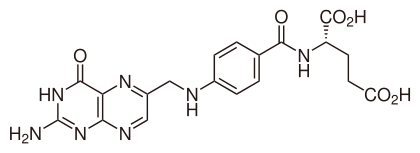
Folate for Treatment-Resistant Depression
Supplementing SSRIs with the biologically available form of folate increases response but not remission rates.
Folic-acid and related deficiencies have been associated with depression. A promising strategy for treatment-resistant depression is to target the one-carbon cycle involving homocysteine's conversion to methionine, where L-methylfolate, facilitated by vitamin B12, acts as a methyl donor; methionine next combines with ATP to form S-adenosylmethionine, a methyl donor facilitating dopamine, norepinephrine, and serotonin synthesis. Researchers recently reported results from two manufacturer-funded, randomized, controlled, double-blind, L-methylfolate studies using a complex, two-phase "sequenced parallel comparison design."
First, 148 nonpsychotic, unipolar depressed patients who failed to respond to selective serotonin reuptake inhibitors (SSRIs) continued their medications, augmented with 7.5 mg/day of L-methylfolate or placebo for 1 month, followed by placebo or 7.5 mg/day or 15/mg/day of L-methylfolate for another month. The second study, involving 75 patients, used a similar design but only the higher L-methylfolate dose. No differences were seen in remission rates. However, the 15-mg dose had a higher response rate than placebo (32% vs. 15%), with a respectable "number needed to treat" of 6. Adverse effect rates were similar for drug and placebo.
Comment: Other studies in treatment-resistant depressed patients have similarly signaled the potential value of augmenting SSRIs with methyl donors that enhance the pathway from homocysteine to S-adenosylmethionine. Editorialists note that individuals homozygous for the T allele on a gene converting folate to L-methylfolate (8%–20% of white Americans) have only 30% of the converting capacity of C carriers and modestly but significantly higher depression rates; such patients may prove to particularly benefit from folate supplementation. Folate deficiency can also result from the use of some anticonvulsants and other medications, malabsorption and dietary deficiencies, alcoholism, various chronic diseases, and gastric cancer. Because folate administration can mask B12 deficiency, clinicians should order B12 laboratory studies before patients start L-methylfolate.
— Joel Yager, MD
Published in Journal Watch Psychiatry January 7, 2013
|
||||||||||||||||||||||||||||||||||||
|
|||||||||||||||||||||||||||||||||





 留言列表
留言列表
 線上藥物查詢
線上藥物查詢 